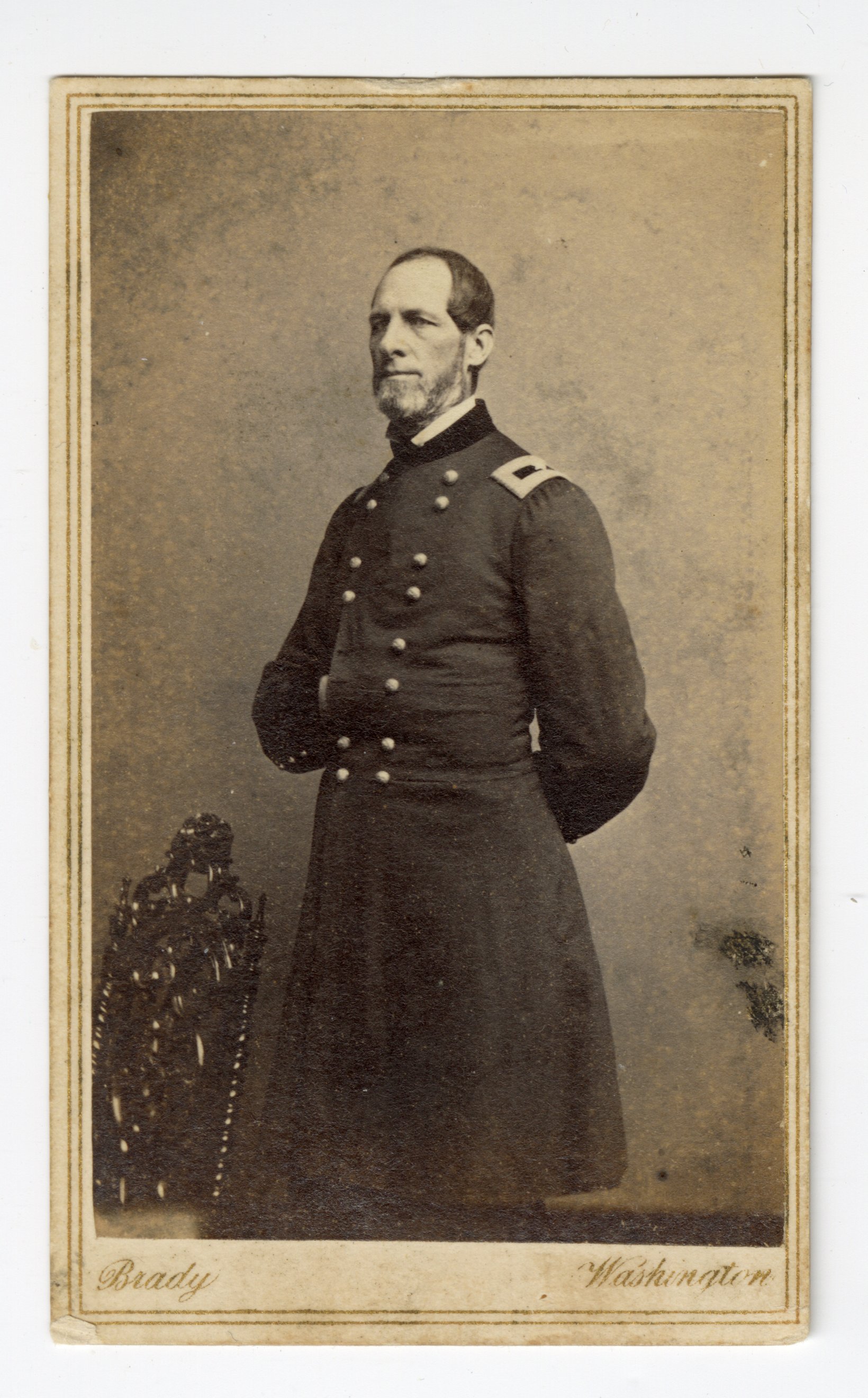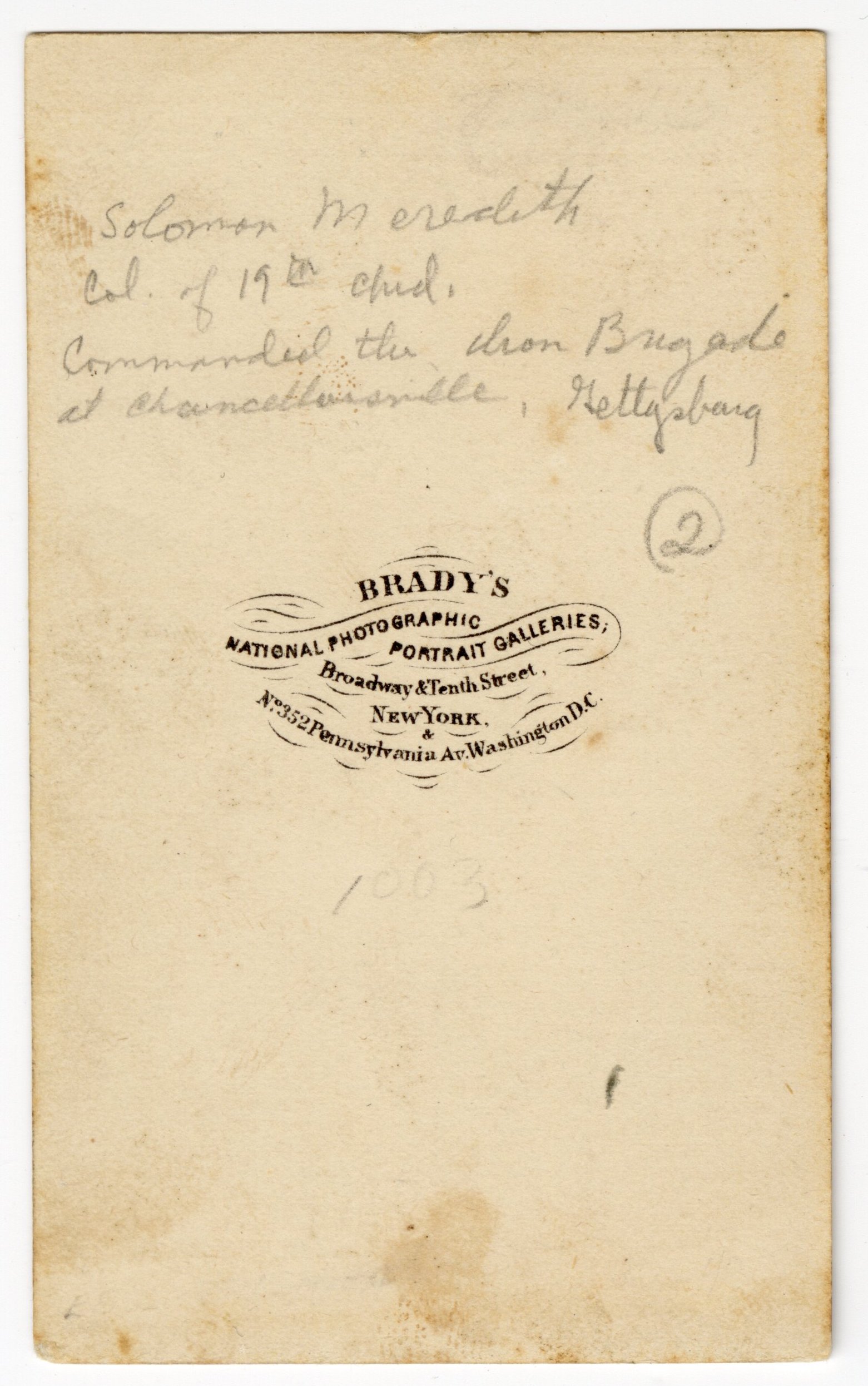19th Indiana Infantry - Iron Brigade - Wounded at Gettysburg
Item CDV-10826
Solomon Meredith
Price: $2400.00
Description
Solomon Meredith (May 29, 1810 – October 2, 1875) was an Indiana farmer, politician, and lawman who became a controversial Union Army general in the American Civil War. One of the commanders of the Iron Brigade of the Army of the Potomac, Meredith led the brigade in the Battle of Gettysburg. Although he never fully recovered from the wounds he received that day, he became a prize-winning farmer and cattleman at home and hosted veterans of his unit.When the Civil War erupted in early 1861, Meredith recruited hundreds of men from his county and organized them into a volunteer regiment of infantry. Governor Oliver P. Morton appointed Meredith as the first colonel of the newly named 19th Indiana, despite his lack of previous military experience. The regiment traveled by train to Washington, D.C., where it eventually joined the Army of the Potomac and brigaded with three Wisconsin regiments in what became famous as the Iron Brigade.
Meredith and his Hoosiers fought their first engagement during the Northern Virginia Campaign at Brawner's Farm, where his horse was shot from under him, crushing him and breaking several ribs. During the Maryland Campaign, Meredith took part in the Battle of South Mountain. He then abruptly reported himself unfit for duty due to the lingering effects of his injuries at Brawner's Farm and fatigue resulting from to the long march up from Virginia. He went to Washington to rest and recuperate while his replacement, Lieutenant Colonel Alois O. Bachman, was killed while leading a charge near the Cornfield at Antietam.
As far as Brigadier General John Gibbon was concerned, he deserved to be stripped of his command for this. A month later, Gibbon was promoted to Major General and given the 2nd Division, I Corps to command, then recommending either Colonel Lysander Cutler of the 6th Wisconsin or Colonel Lucius Fairchild of the 2nd Wisconsin to take over the Iron Brigade. However, Major General Joseph Hooker, who had commanded the I Corps at Antietam and was recovering from a wound sustained in that battle, was visited by Meredith requesting promotion to brigadier general.
Regardless of the Antietam fiasco and Gibbon's disdain for him, Meredith had powerful political connections in the form of Indiana Governor Oliver Morton. This was enough to convince Hooker, who submitted his request to Washington. In November, Meredith took the field wearing the stars of a brigadier general while John Gibbon fumed and cursed Hooker as a man who had sacrificed his principles for political gain. Meredith led the brigade in combat for the first time at Fredericksburg, where he drew the ire of division commander Major General Abner Doubleday, who temporarily replaced Meredith with Colonel Lysander Cutler.
In the spring of 1863, Meredith's brigade participated in the Chancellorsville Campaign, but saw relatively little combat. That changed in July, when the Iron Brigade suffered significant casualties during the first day's fighting at Gettysburg in Herbst's Woods and on Seminary Ridge. They were one of the first infantry brigades to reach the field. In the morning they routed the shocked and exhausted brigade of Brigadier General James J. Archer and captured Archer.
In the afternoon the brigade was ravaged by a flanking maneuver by the 11th North Carolina and a frontal assault by the 26th North Carolina, of Confederate Brigadier General J. Johnston Pettigrew's brigade. Meredith was wounded when he was struck in the head by shrapnel, fracturing his skull and giving him a severe concussion. The blow killed his horse, which then fell on him, breaking his ribs and injuring his right leg. He was disabled and unfit for any further field command.
Meredith performed administrative duty for the rest of the war, commanding garrisons protecting Union river ports along the Mississippi at Cairo, Illinois, and Paducah, Kentucky. While still on Army duty in mid-1864, Meredith unsuccessfully ran against George Julian for the United States House of Representatives. Openly feuding with his opponent, Meredith beat Julian unconscious with a whip, but used his political influence to have charges of assault and battery dropped.
Source: Wikipedia


